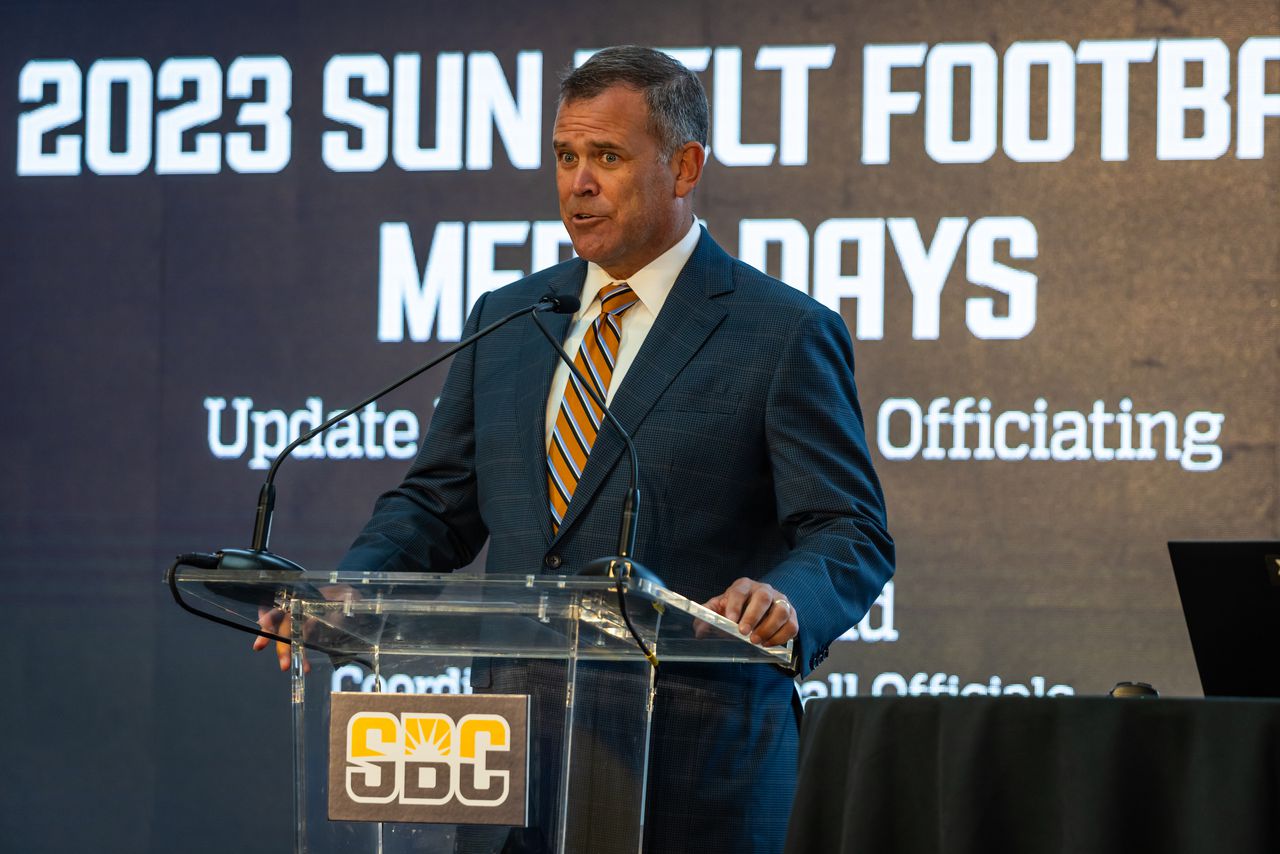McDaid: Coaches âundecidedâ on college footballâs new rules
John McDaid, head of football officiating for the SEC and Sun Belt Conference, said Wednesday coaches are “undecided” about the new rules for 2023 designed to shorten games.
The NCAA Playing Rules Oversight Panel in April approved three major changes for football’s clock rules beginning with this season:
1. Teams may no longer call consecutive timeouts, as they have often done when trying to “ice” an opposing kicker who is set to attempt an important field goal or extra point.
2. Penalties that occur on the finally play of the first or third quarter will now carry over to the following quarter. This means no more “untimed downs” with no time on the clock.
3. The game clock will no longer stop after first downs in order to reset the chains, except in the final two minutes of a half. The NFL has a similar rule in regards to its game clock
The first two rules are largely non-controversial, but the third is going to affect how college football is played. Not only will it shave some “real” time off the action, thus limiting the number of plays each team runs.
RELATED: Sun Belt ‘premier’ Group of 5 conference in college football, coaches say
“It was definitely aimed at trying to take plays out of the game,” McDaid said. “We were 178 plays per game last season, as opposed to 154 in the NFL. Again, 178 is not necessarily a bad number, but what the (conference) commissioners look at it, they’re seeing a lot of games, too many games that are 200-plus plays.
“That’s what’s bringing concern, and that’s why they’re looking at a real change, like keeping the clock running after a first down, to drive down the number of plays. How many plays it will remove from the game remains to be seen.”
The proliferation of high-tempo spread offenses — which focus on rushing to the line of scrimmage and getting the snap off with as much time left on the play clock possible — in the last decade has caused games to last at three hours in almost all cases. The average game time in the FBS was 3 hours, 27 minutes in 2022, up an average of nine minutes from a decade ago.
Television, of course, is partly to blame for the time inflation, with higher broadcast fees leading to a need (or at least a perceived need) for more advertising breaks. And then there are instant replay reviews, some of which can seemingly last an eternity.
“I don’t know that a coach is concerned about his game when it’s three hours and 50 minutes, unless the 3-hour-and 50-minute game time is created by six replay reviews,” McDaid said. “There is concern from the coaching community about what replay reviews are doing to the flow of the game. But let’s say we only go to replay booth one time and just the style of play in that particular game created the 3-hour, 45-plus minute game. I don’t know that coaches are necessarily complaining about that taking plays out of the game.
“The coaches that I have in the SEC and the Sun Belt, I haven’t heard a great amount concern about that. I think if you have the ball with four minutes left in the game and you need a score, if you’re behind by four or more, you need a score and you don’t care about how long it takes.”
Coaches, of course, are not a monolithic entity. Some came up as offensive assistants, while others specialized in defense.
GJ Kinne, the first-year coach at Texas State, is a disciple of spread offense gurus Chad Morris and Gus Malzahn. Kinne was previously head coach on the FCS at Incarnate Word, which averaged 51.5 points, nearly 600 yards of offense and more than 70 offensive plays per game in 2022.
“Any time there’s a rule change, I think you’ve just got to adapt and go with it, obviously,” Kinne said. “I want to run as many plays as possible. So I don’t necessarily love the rule, but I think we’ll kind of see how it plays out. I don’t think it’ll affect us too much.”
South Alabama head coach Kane Wommack made his name as a defensive coordinator at Eastern Illinois, Indiana and in a previous stint with the Jaguars. His team often had trouble stopping “tempo” offenses in 2022, most notably in the New Orleans Bowl loss to Western Kentucky.
Wommack, obviously, has to think about his team’s offense at well. And thus, he can see both sides, he said.
“I think limiting a few plays here and there, from a defensive perspective, is a good thing,” Wommack said. “But I think it depends on the game. If I need a couple extra plays offensively (and clock rules don’t allow for it), I’m not going to be happy about it. But at the same time, I think it’s probably a necessary adjustment, with the length of games right now add the TV (aspect), which is an important piece of what we do.
“And so if that is going to help in some small way, we’re all going to have to learn to navigate it. Ultimately, the rules are always going to continue to evolve in the game of football. And you’ve got to be ready.”
